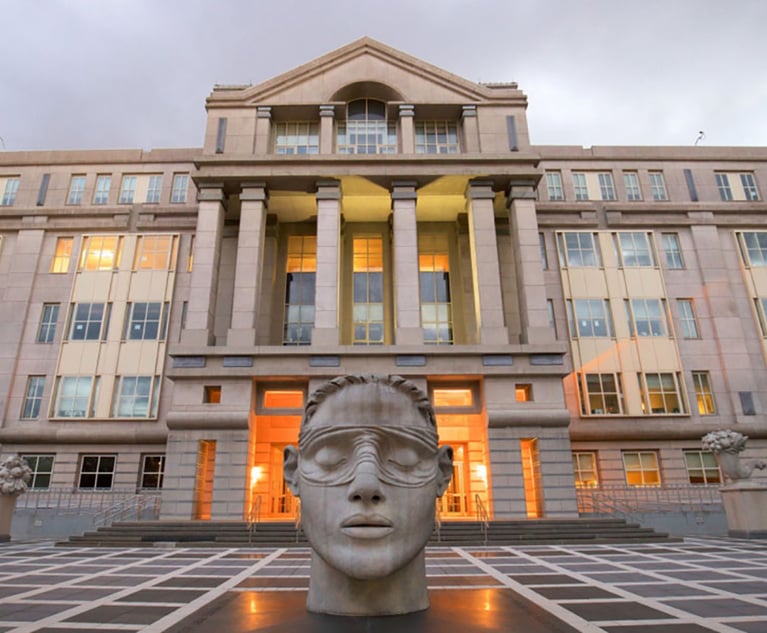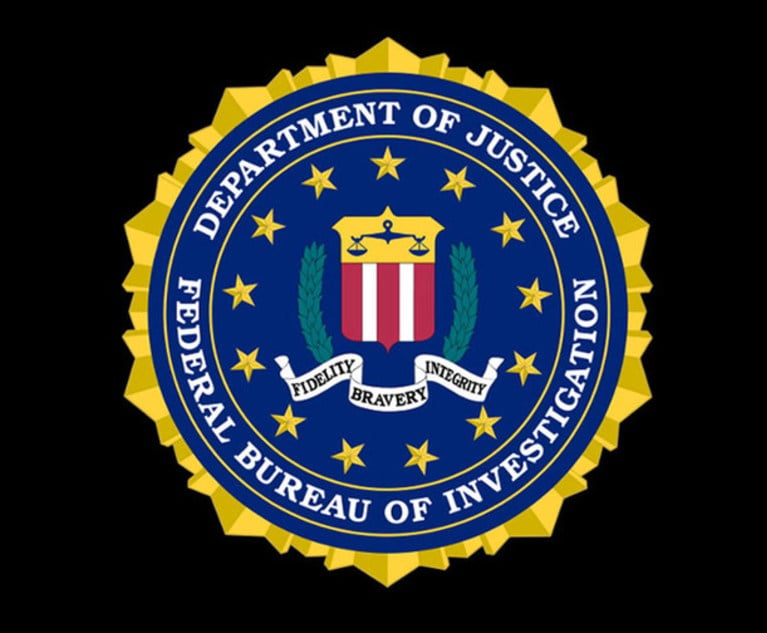FTC Calls Foul on CBD and Cannabis Marketing Claims During COVID-19 Pandemic
Given the FDA's ramped-up enforcement efforts, it is anticipated that we will see additional warning letters, lawsuits, and injunctive action taken in the foreseeable future in order to protect consumers during the pandemic.
June 08, 2020 at 10:00 AM
5 minute read
 William Casey / Shutterstock.com
William Casey / Shutterstock.com
Amid the COVID-19 pandemic, a number of cannabis companies that advertised CBD products as effective in preventing or treating COVID-19 without obtaining U.S. Food and Drug Administration (FDA) approval have become targets of Federal Trade Commission (FTC) enforcement actions. By way of example, on April 22, 2020, the FTC filed an administrative complaint against Marc Ching, individually and as Whole Leaf Organics, to cease unfair or deceptive practices and false advertisements for products affecting commerce in violation of the Federal Trade Commission Act. Two days later, the FTC petitioned the Unites States District Court, Central District of California, to enter a temporary restraining order and grant a preliminary injunction enjoining Marc Ching and Whole Leaf Organics from disseminating false or unsubstantiated advertisement claims that the CBD products marketed as CBD-EX, CBD-RX, and CBD-Max treat cancer, and the CBD product marketed as "Thrive" prevents or reduces risk associated with COVID-19. In response to the FTC complaint, Marc Ching and Whole Leaf Organics agreed to a preliminary order to cease advertising these claims.
The fact that the FTC filed this lawsuit presents a notable departure from its previous enforcement activity and that of the FDA. This suit demonstrates the FTC's commitment to protecting Americans from harm caused by products falsely claiming to prevent or treat serious diseases, such as COVID-19. In fact, on April 20, 2020, the FTC commented that "[a]t a time when Americans are looking for any hope and solutions to the COVID-19 pandemic, we're increasingly concerned about the deceptive practices some marketers can, have, and will employ."
Before the pandemic, in late November, the FDA began sending warning letters to companies who marketed CBD products in interstate commerce based upon alleged violations of the Federal Food, Drug, and Cosmetic Act (FD&C Act). In particular, CBD companies that received these warning letters were accused of using product webpages, online stores and social media as channels to advertise CBD product claims associated with preventing, diagnosing, mitigating, treating and/or curing serious diseases, such as cancer, or for other unsubstantiated uses, such as therapeutic uses for humans and/or animals. Other violations cited marketing CBD products as dietary supplements and adding CBD to human and animal foods. Under the FD&C Act, any product intended to treat a disease or otherwise have a therapeutic or medical use, and any product (other than food) that is intended to affect the structure or function of the body of humans or animals, is categorized as a drug, which must be approved by the FDA. Therefore, if a CBD product is marketed in such a way, the manufacturer is required to first obtain approval from the FDA.
Prior to the enforcement action filed in April, the FDA had issued a warning letter to Whole Leaf Organics concerning advertising CBD-EX, CBD-RX, and CBD-Max products as "effective when combating cancer cells …. It has been able to kill cancer cells, as well as prevent additional cells from growing." The unapproved new drugs were being sold in violation of section 505(a) and 301(d) of the FD&C Act. The FDA warning provided Whole Leaf Organics with 15 days from the date of receipt of the letter to take corrective action. However, it appears that Whole Leaf Organics did not cease making such claims until after the enforcement action was filed.
On April 6, 2020, the FDA issued similar warnings to other CBD manufacturers who claimed that their CBD products were safe and/or effective for the treatment or prevention of COVID-19. For instance, Native Roots Hemp claimed that cannabis "speeds recovery" from COVID-19, and touted cannabis resin as an "antiviral" that "inhibits cell proliferation." Indigo Naturals suggested that CBD boosts T-cells with "powerful weapons" that could ward off COVID-19. The warning letters sent by the FTC to both Native Roots Hemp and Indigo Naturals alleged that the products being sold were unapproved new drugs and therefore violated sections 505(a), 301(a) and (d) of the FD&C Act. The FDA demanded that each company take immediate corrective action, including removing all misleading representations that their products are safe and effective for COVID-19.
Upon receipt of an FDA warning letter, a company typically has 15 days to respond. However, due to the emergent nature of the COVID-19 pandemic, Native Roots Hemp and Indigo Naturals were given just 48 hours to comply. Pursuant to applicable regulations, failure to respond to an FDA warning letter may result in legal action without further notice, including, without limitation, seizure and injunction.
Given the FDA's ramped-up enforcement efforts, it is anticipated that we will see additional warning letters, lawsuits, and injunctive action taken in the foreseeable future in order to protect consumers during the pandemic. The FDA's position has been clearly articulated when it stated, "Let's be clear: companies making these claims can look forward to an FTC lawsuit like this one."
This article is not intended to convey any legal advice concerning the legality of cannabis or CBD products nor is it intended to support any such efforts. Please consult with independent legal counsel should you have questions concerning the legality of cannabis or CBD products.
Michael F. Schaff is co-chair of the Health Law and Corporate teams at Wilentz, Goldman & Spitzer, P.A. in Woodbridge, NJ. Michael may be reached at [email protected].
Lisa Gora is an attorney at Wilentz, Goldman & Spitzer, P.A. in Woodbridge, NJ, who practices on the Health Law and Corporate teams. Lisa may be reached at [email protected].
This content has been archived. It is available through our partners, LexisNexis® and Bloomberg Law.
To view this content, please continue to their sites.
Not a Lexis Subscriber?
Subscribe Now
Not a Bloomberg Law Subscriber?
Subscribe Now
NOT FOR REPRINT
© 2025 ALM Global, LLC, All Rights Reserved. Request academic re-use from www.copyright.com. All other uses, submit a request to [email protected]. For more information visit Asset & Logo Licensing.
You Might Like
View All
'Younger and Invigorated Bench': Biden's Legacy in New Jersey Federal Court
5 minute read
3rd Circuit Strikes Down NLRB’s Monetary Remedies for Fired Starbucks Workers


As Trafficking, Hate Crimes Rise in NJ, State's Federal Delegation Must Weigh in On New UN Proposal
4 minute readLaw Firms Mentioned
Trending Stories
- 15th Circuit Considers Challenge to Louisiana's Ten Commandments Law
- 2Crocs Accused of Padding Revenue With Channel-Stuffing HEYDUDE Shoes
- 3E-discovery Practitioners Are Racing to Adapt to Social Media’s Evolving Landscape
- 4The Law Firm Disrupted: For Office Policies, Big Law Has Its Ear to the Market, Not to Trump
- 5FTC Finalizes Child Online Privacy Rule Updates, But Ferguson Eyes Further Changes
Who Got The Work
J. Brugh Lower of Gibbons has entered an appearance for industrial equipment supplier Devco Corporation in a pending trademark infringement lawsuit. The suit, accusing the defendant of selling knock-off Graco products, was filed Dec. 18 in New Jersey District Court by Rivkin Radler on behalf of Graco Inc. and Graco Minnesota. The case, assigned to U.S. District Judge Zahid N. Quraishi, is 3:24-cv-11294, Graco Inc. et al v. Devco Corporation.
Who Got The Work
Rebecca Maller-Stein and Kent A. Yalowitz of Arnold & Porter Kaye Scholer have entered their appearances for Hanaco Venture Capital and its executives, Lior Prosor and David Frankel, in a pending securities lawsuit. The action, filed on Dec. 24 in New York Southern District Court by Zell, Aron & Co. on behalf of Goldeneye Advisors, accuses the defendants of negligently and fraudulently managing the plaintiff's $1 million investment. The case, assigned to U.S. District Judge Vernon S. Broderick, is 1:24-cv-09918, Goldeneye Advisors, LLC v. Hanaco Venture Capital, Ltd. et al.
Who Got The Work
Attorneys from A&O Shearman has stepped in as defense counsel for Toronto-Dominion Bank and other defendants in a pending securities class action. The suit, filed Dec. 11 in New York Southern District Court by Bleichmar Fonti & Auld, accuses the defendants of concealing the bank's 'pervasive' deficiencies in regards to its compliance with the Bank Secrecy Act and the quality of its anti-money laundering controls. The case, assigned to U.S. District Judge Arun Subramanian, is 1:24-cv-09445, Gonzalez v. The Toronto-Dominion Bank et al.
Who Got The Work
Crown Castle International, a Pennsylvania company providing shared communications infrastructure, has turned to Luke D. Wolf of Gordon Rees Scully Mansukhani to fend off a pending breach-of-contract lawsuit. The court action, filed Nov. 25 in Michigan Eastern District Court by Hooper Hathaway PC on behalf of The Town Residences LLC, accuses Crown Castle of failing to transfer approximately $30,000 in utility payments from T-Mobile in breach of a roof-top lease and assignment agreement. The case, assigned to U.S. District Judge Susan K. Declercq, is 2:24-cv-13131, The Town Residences LLC v. T-Mobile US, Inc. et al.
Who Got The Work
Wilfred P. Coronato and Daniel M. Schwartz of McCarter & English have stepped in as defense counsel to Electrolux Home Products Inc. in a pending product liability lawsuit. The court action, filed Nov. 26 in New York Eastern District Court by Poulos Lopiccolo PC and Nagel Rice LLP on behalf of David Stern, alleges that the defendant's refrigerators’ drawers and shelving repeatedly break and fall apart within months after purchase. The case, assigned to U.S. District Judge Joan M. Azrack, is 2:24-cv-08204, Stern v. Electrolux Home Products, Inc.
Featured Firms
Law Offices of Gary Martin Hays & Associates, P.C.
(470) 294-1674
Law Offices of Mark E. Salomone
(857) 444-6468
Smith & Hassler
(713) 739-1250






